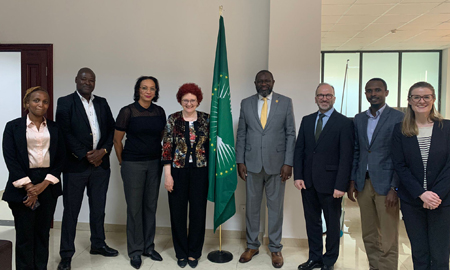External cooperation
ECDC’s collaboration with major Centres for Disease prevention and Control (CDCs)
 In 2022, ECDC held the second in-person meeting with its focal points at major Centres for Disease Control (CDCs) that are also members of the network of major CDCs. Participants shared information on how bilateral and multilateral international cooperation is organised within each organisation, and the changes being implemented based on the lessons learned post-COVID-19 outbreak.
In 2022, ECDC held the second in-person meeting with its focal points at major Centres for Disease Control (CDCs) that are also members of the network of major CDCs. Participants shared information on how bilateral and multilateral international cooperation is organised within each organisation, and the changes being implemented based on the lessons learned post-COVID-19 outbreak.
ECDC also had meetings with potential new partners such as Australia, Brazil, Gulf Centre for Disease Prevention and Control (Gulf CDC), India and Japan, to exchange information and experiences on COVID-19 and to discuss the possibility of establishing bilateral relations in the form of an MoU.
In 2022, ECDC worked closely with Africa CDC on the implementation of the four-year technical partnership project entitled ‘EU for Health Security in Africa: ECDC for Africa CDC’ with funding from the European Commission’s Directorate-General for International Partnerships (DG INTPA). The overall aim is to contribute to health security in Africa, by sharing EU practices and strengthening Africa CDC’s capacities in preparedness, surveillance and response to health threats posed by communicable diseases.
Support to Western Balkans and Türkiye
With external financial assistance from the European Commission Directorate-General for Neighbourhood and Enlargement Negotiations (DG NEAR) under the Instrument for Pre-accession Assistance (IPA), ECDC continued to implement the project ‘Preparatory measures for the participation of the Western Balkans and Türkiye in the European Centre for Disease Prevention and Control with special focus on One-Health against AMR and enhanced SARI surveillance, 2020 – 2024’ (ECDC-IPA6 project).
To support national authorities in implementing EU acquis on serious cross-border threats to health, in particular, by strengthening surveillance, preparedness, and microbiology laboratory system capacities supporting public health, the experts from IPA beneficiary countries were invited to participate as observers at ECDC national focal point forums and meetings.
The year 2022 saw further integration of the Western Balkans and Türkiye into ECDC networks and structures.
To support the implementation of fit-for-purpose surveillance systems in the Western Balkans and engage in vaccine effectiveness studies, ECDC included all six Western Balkan candidate countries and potential candidates in the E-SARI-Net activities.
In 2022, ECDC delivered the 2022 work programme for the EU Initiative on Health Security (HSI), which is a five-year programme to enhance the public health preparedness and response capacities of the European Union enlargement and European Neighbourhood Policy (ENP) partner countries, funded by DG NEAR.
The Mediterranean and Black Sea Programme for Intervention Epidemiology Training (MediPIET)
In 2022, MediPIET organised several training courses for two cohorts, for example in ‘Multivariable Analysis Module and Inject Day’ and ‘Rapid Risk Assessment and Survey methods’.
MediPIET Cohort 5 formally kicked-off in September, followed by its first activities, such as ‘Introductory course 2022’., ‘Times Series Analysis module’, ‘Operational Research Inject Days’ and an ‘Introduction to R statistical software’ courses.
The Advisory Board of the Training Programs in Epidemiology and Public Health Interventions (TEPHINET) officially approved MediPIET as a full member in November. Finally, ECDC organised the MediPIET annual scientific event on ECDC’s premises during ESCAIDE (the European Scientific Conference on Applied Infectious Disease Epidemiology). The ESCAIDE Conference also hosted a MediPIET side session entitled ‘The role of national FETPs in strengthening countries’ capacities for infectious disease prevention and response’.
Coordination with EU and international partners
During the past year, ECDC has further strengthened its coordination and collaboration with key partners, both at the EU and global level.
In 2022, preparations got underway to define the scope and purposes of a Memorandum of Understanding between DG HERA and ECDC, to be finalised in 2023. The aim is to coordinate the work of the parties in support of health emergency preparedness and response and to avoid duplication of activities. Areas of cooperation will include intelligence gathering and assessment of health threats, modelling and foresight activities, preparedness and response capacities, and planning, as well as the international dimension.
Collaboration with other EU agencies, such as the European Medicines Agency (EMA) and the European Aviation Safety Agency (EASA), related to COVID-19 was intensified during 2022. For the MoU with EMA, a new technical annex will be adopted in 2023 to provide a framework for the agencies to collaborate on post-authorisation monitoring of vaccines. EASA and ECDC agreed to replace their framework agreement, concluded in 2011, with an updated set of arrangements which is currently being finalised. The areas of collaboration include a regular exchange of information and the sharing of relevant ECDC output, such as the weekly Communicable Disease Threat Report (CDTR), potential risk assessments or technical guidance. Furthermore, the EASA-ECDC Aviation Health Safety Protocol, first published in 2020 was updated in 2022.
ECDC continues to actively participate in the annual European Health Forum Gastein. In 2022, ECDC organised a session on the ethical dilemmas encountered during the COVID-19 pandemic, with a range of speakers at Member State, EU and global level.
In 2022, ECDC’s close collaboration with WHO continued. ECDC and WHO’s Regional Office for Europe held several coordination meetings, including one at director level. At a technical level, ECDC and WHO’s Regional Office for Europe have worked very closely and jointly implemented or collaborated on 67 activities within the different disease programmes. In addition, ECDC initiated contact with the WHO Hub for Epidemic and Pandemic Intelligence and discussed areas of mutual interest such as on epidemic intelligence, public health training and surveillance.